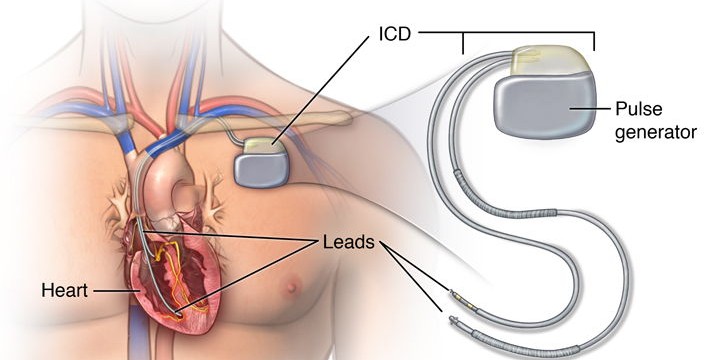ICD & CRT IMPLANTATION
Implantable Cardioverter Defibrillator (ICD): It is a special type of pacemaker, which is useful to control very fast heart rate which can occur in certain diseases. Very fast heart rate of lower chamber of the heart (ventricular tachycardia/fibrillation) is very serious and life threatening condition. If it is not treated promptly, patient can become unconscious or even die in few minutes. ICD is a special device similar to pacemaker can immediately deliver electrical impulse or shock to the heart when it detects this serious rhythm problem.
Biventricular pacemaker / Cardiac Resynchronization Therapy (CRT): It contains three leads – two in upper and lower chambers of right side of the heart and third placed in left side of the heart. It is useful in the patient of heart failure. A biventricular pacemaker paces both ventricles so that all or most of the ventricular muscle pumps together. This allows the heart to pump blood more effectively.
SPECIAL PRECAUTIONS
Physical Activity: Do not hold your arm above shoulder level for 3-4 weeks after pacemaker implantation. Avoid activities that require pushing or pulling heavy objects. Ask your doctor how much and what kinds of physical activities are safe for you. Self-driving should be avoided if you have implanted ICD.
MRI: Avoid standing near strong magnetic field including MRI rooms if you have pacemaker implanted. All pacemakers are not MRI compatible and you cannot undergo MRI if you have pacemaker which is not compatible with MRI. Even though you have MRI compatible pacemaker, consult your cardiologist before undergoing any MRI.
Electrical Interference:
- It is safe to talk on a cellphone, but avoid placing your cell phone or MP3 players/iPods directly over your pacemaker implantation site.
- Passing through an airport metal detector won’t interfere with your pacemaker, although the metal in it may sound the alarm. Security staff can check you with a metal detector wand as long as it isn’t held for too long over your pacemaker site. You should avoid sitting or standing close to a security system metal detector. Notify security staff if you have a pacemaker. To avoid potential problems, carry an ID card stating that you have a pacemaker.
- Stay at least 2 feet away from industrial welders, high-voltage transformers or motor-generator systems.
- Shock-wave lithotripsy and electro-cautery used in surgery can interfere with the function of your pacemaker. Let all of your doctors, dentists, and medical technicians know that you have a pacemaker.
DOES PACEMAKER HAVE BATTERY? HOW LONG WILL MY PACEMAKER LAST?
Once your pacemaker is implanted, the battery should last 5-10 years, depending upon how frequently you need pacing. When a pacemaker’s battery wears out, your doctor will replace the generator along with the battery. Your doctor can tell you whether your pacemaker or its wires need to be replaced after interrogation of your pacemaker.

